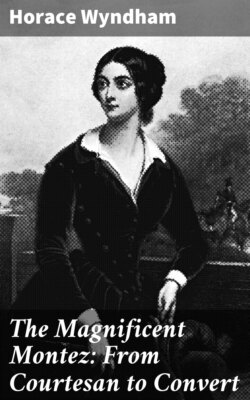Читать книгу The Magnificent Montez: From Courtesan to Convert - Horace Wyndham - Страница 21
На сайте Литреса книга снята с продажи.
II
ОглавлениеTable of Contents
This was all that the public knew of the case. It did not seem much on which to blast a young wife's reputation. Dr. Lushington, the judge of the Consistory Court, however, knew a good deal more about the business than did the general public. This was because, during the preliminary hearing, held some months earlier and attended only by counsel and solicitors, a number of damaging facts had transpired.
Mrs. James, said learned counsel for the petitioner, had "been guilty of behaviour at which a crocodile would tremble and blush." A serious charge to bring against a young woman. Still, in answer to the judge, he professed himself equipped with ample evidence to support it. His first witness was a retired civil servant, a Mr. Browne Roberts, who had known the respondent's husband, first, as a bachelor in India, and afterwards as a married man in Dublin. At the beginning of 1841, he had received a call, he said, from a Major McMullen to whom Captain Craigie had written, asking him to take charge of his step-daughter on her arrival in London and see her off to his relatives in Scotland. When, however, the major offered this hospitality, it was refused. Thereupon, Mr. Roberts had himself called at the Imperial Hotel, Covent Garden, and suggested that she should come and stop with his wife; and this invitation was also refused.
Not much in this perhaps, but a good deal in what followed. Mrs. Elizabeth Walters, the manageress of the Imperial Hotel, said that on February 21, 1841, "a lady and gentleman arrived in a hackney cab, with luggage marked G. Lennox and Mrs. James, and booked a double room." Mrs. Walters had not, she admitted, "actually discovered them undressed, or sharing the bed," but "she would not have been surprised to have done so." Accordingly, when her travelling companion left the next morning, she taxed Mrs. James with misconduct. After telling her to "mind her own business," Mrs. James had declared that she and Captain Lennox were on the point of being married, and had then packed up and left the establishment.
"What exactly did she say?" enquired the judge.
"She said, 'what I choose to do is my own affair and nobody else's.'"
On leaving the somewhat arid hospitality of the Covent Garden Hotel, Mrs. James had removed to a lodging-house just off Pall Mall, where she stopped for a month. Mrs. Martin, the proprietress, told the court that, during this period, Captain Lennox settled the bill, and "called there every day, often stopping till all hours of the night."
The testimony of Mrs. Sarah Watson, the sister of Captain James, was that her brother had written to her in the autumn of 1840, saying that his wife had been thrown from her horse and was coming to England for medical treatment; and that he had written to his aunt, Mrs. Rae, of Edinburgh, suggesting that his wife should stop with her. Mrs. Watson, having "been told things," then called on Mrs. James in Covent Garden. "I spoke to her," she said, "of the shocking rumour that Captain Lennox had passed a night with her there, and pointed out the unutterable ruin that would result from a continuance of such deplorable conduct. I begged her to entrust herself to the care of Mrs. Rae. My entreaties were ineffectual. She positively declared, affirming with an oath, that she would do nothing of the kind."
Among the passengers on board the East Indiaman by which Mrs. James had voyaged to England was Mrs. Ingram, the captain's wife. "The conduct of Mrs. James," she said, "was unguarded in the extreme, and her general behaviour was what is sometimes called flirting." Captain Ingram, who followed, had a still more disturbing story to recount. "On several occasions," he said, "I heard Mrs. James address the gentleman who joined us at Madras as 'Dear Lennox,' and she would even admit him to the privacy of her cabin while the other passengers were attending divine service on deck. When I spoke to her about it, she answered me in a very cool fashion."
All this was distinctly damaging. The real sensation, however, was provided by Caroline Marden, a stewardess.
"During the voyage from Madras," she told the astonished judge, "I more than once saw Captain Lennox lacing up Mrs. James's stays."
"Did you see anything else?" faltered counsel.
"Yes, I also saw her actually putting on her stockings while Captain Lennox was in her cabin!"
There were limits to intimacies between the sexes. This was clearly among them. For a man to assist in adjusting a woman's stays, and watch her changing her stockings, could, in the opinion of the learned and experienced Dr. Lushington, only lead to one result. The worst result. Hence, he had no difficulty in pronouncing the decree for which the husband was applying.
